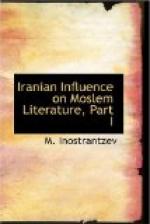[Footnote 2: Most probably in connection with the materials of this book stood A collection of Persian genealogy written by the well-known Ibn Khurdadbeh (Fihrist 149, 4), representing a peculiar antithesis to the numerous selections of Arab tribal and family genealogies.]
[Footnote 3: Here are first mentioned the two books translated by Jabala ibn Salim, namely, the Book of Rustam and Isfandiyar and the Book of Behram Chobin (the well-known Romance of the King about which, sea Noeldeke’s Tabari 474-478), and further the Book of Shahrzad and Aberviz (which no doubt was connected with the Thousand and one Nights), the Book of Kar Nameh or the “Acts” of Anushirwan belonging to the same class of books as the Kar Nameh of Ardashir. Then the books that interest us are the Book of Taj, the Book of Dara and the Golden Idol, the Ain Nameh, the Book of Behramgor and his brother Narseh and finally, one more Book of Anushirwan.]
It is possible that the book of Ibn al Mukaffa was not the first translation of the Persian book since this title is applied by not a few other Arabic writers of the time to some of their own works. (For example, Abu Ubaida, See Goldziher Muhammed Studien 1,198).
In his time Baron Rosen called attention to quotations from a certain Book of Taj in Uyunal Akhbar of Ibn Qutaiba.[1] These quotations are only to be found in the first part of the Uyunal Akhbar. All these quotations, eight in number, bear a didactic character, and excepting three, refer back to Kisra Abarviz and contain his testament to his sons (two), secretaries, treasurers and hajibs. Of the remaining three one bears on general maxims of practical politics. Another is a testament of an ancient Persian king to his Wazir. And the third is a maxim of one of the secretaries of a king. In this manner all these citations are of an ethicodidactic nature; only they have been invested with a historical environment and under ordinary circumstances would represent the general type of writings on political conduct for rulers, standing for the class of literature designated Furstenspiegel. A similar class of citations is preserved in the “speeches from the throne” and the counsels of the Sasanian kings which we come across in various Arab historical and anthological works bearing on Sasanian Persia, as also in the Shah Nameh.
[Footnote 1: Baron Rosen, Zur arabischen Literatur geschichte der altern zeit, 1. Ibn Qutaiba; Kitab Uyunal Akhbar (Melanges Asiatiques, VIII, 1880, 745-779, especially 774-775). These citations correspond to those in the edition of Brockelmann as follows: 21, 12-16; 27, 11-15; 32, 2-8; 44, 13-45, 4; 67, 13-66, 8; 84, 8-16; 107, 2-17; 120, 16-121, 5.]




